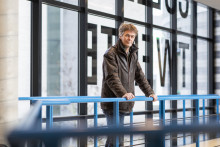Han Warmelink is the first-ever ombuds officer at the University of Twente. The lawyer and university lecturer by background was hired as part of a two-year pilot project in October 2019. So far he has handled sixteen cases – two a week on average. ‘It’s normal that there are issues,’ he says. ‘The main part of my job is finding the real problem.’
Han Warmelink
2019 – now Ombudsman, University of Twente
2019 – now Course coordinator of Constitutional Law, Nyenrode Business University
2015-2018 Lector of Privatization, HAN University of Applied Science
2008-2017 Deputy chair of the national complaints committee for primary and secondary education
2002-2015 Senior lecturer of Constitutional Law, University of Groningen
1993 Doctor of Law, University of Groningen
How would you describe your work as an ombudsperson?
Warmelink: ‘I mostly listen. I listen to the issue and try to open doors to the solution, but it is not my job to do the work of the complaints committee. The role of the ombudsperson is different everywhere, though. At some other universities, the role requires you to give a verdict. That is not what I do here. I’m not a judge. I can’t say “you are right or you are wrong”. I have to remain neutral. I can recommend people to file an official complaint at the complaints committee, but I can’t do it for them.’
What type of issues have you handled so far?
‘People have approached me with all kinds of different problems. I’m here for everyone: academic and support staff, PhD candidates, students… simply anyone related to the UT. For example, I’ve been helping a number of PhD’s who are in trouble because their supervisor is leaving. They came to me because they are looking for a solution wherever they can. I’ve also had cases of people who were unhappy in their position and thinking of finding another job.’
What can people expect if they contact you?
‘Anyone can make an appointment with me. First we have a talk. I always ask “what do you expect from me?” It’s always the person who leads the procedure, it is all up to them. Usually I can find out what the real problem is within half an hour. Because it is almost always a combination of a formal problem and informal issues. Finding the real issue is the main part, only after that we can find a solution. It is a bit like research. First I look for the question and then for the answer. Some cases are easy and can be solved by one conversation, others are complex and still ongoing. I always follow up with the person who approached me to see if the issue has been solved and ask them if their file can be closed.’
You are officially fully independent in your role. Do you share your experiences with anyone?
‘Only on an abstract level. I never discuss the individual cases, but I try to search for bigger themes, for problems that many people share, and report those to the Executive Board. For instance, I’ve already discussed the PhD matter with them, but they should never know who exactly I talk about. All the people who come to me remain completely anonymous. I don’t even write down their names, in my files I give them numbers. Keeping everyone safe is very important.’

How is your position different from confidential advisors or HR advisors?
‘Confidential advisors will of course listen to you and support you, but they can’t solve your problem. HR advisors haven’t got the neutral position I have. I can go into the organisation and try to find a solution. We communicate among each other, of course. Some people were referred to me by HR and some by confidential advisors, and vice versa.’
Why did you apply for this position?
‘I’ve been involved in research and teaching for thirty years. I became a lector, but that didn’t suit me so I searched for something new. This role is not something I’m educated for, but it is a role that I’m suited for. All the problems I’ve been dealing with so far have felt familiar, because university is my background. I’ve also been on a complaint committee for secondary schools. It is very satisfying when you can help people. My wife can always see if I found a solution to an issue because I come home in a very good mood.’
How can the position of an ombuds officer help the UT?
‘There are issues, there will always be issues, but it can be difficult to find your way through them. This position gives people the way. It can also offer solutions on a higher level, not only in individual cases. I try to search for links between the issues and find a bigger solution so we don’t face the same problem again in the future. But I still have to prove myself, of course. We will need to analyze how useful this position is. For now, I’m kind of an “oliemannetje”. I try to make the community run smoothly.’
ombudsman pilot
The University of Twente is one of the four Dutch universities participating in the Ombuds Officer pilot project, which aims to provide a safe environment for work and study. The position of Ombuds Officer complements the current confidential counsellors, complaints committee, student psychologists, study advisors and the student counsellor. UT staff and students can approach the Ombuds Officer to report or discuss a wide range of issues including unacceptable behaviour, workload and termination of employment.








